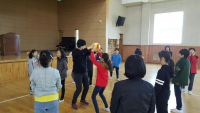The purpose of this study was to examine psychological capital acquisition through Asian Games Participation. 17 of national women football players were completed Psychological Capitals Questionnair. The psychological capital consists of optimism, psychological skills, self-management, collective efficacy, and performance perception was investigated after the team call-ups and before the team-release. The data was analyzed by paired t-test. As results, Korean women football players’ collective efficient and performance perception showed a statistical significance at the beginning of the team call-ups but optimism, psychological skills, and self-direction did not show statistic significances. The team-harmony, interpersonal-management, team-power, sufficient training, trust in coach, efficient communication, and psychological football factors, which were subfactor of football players’ psychological capital, showed statistical significances. However, confidence, concentration, goal-setting, imagery, willpower, anxiety-control, mental-management, life-management, training-management, innate-behavior management, physical-management, football skills, mediative skills, and football intelligence factors did not have statistic significances. These results demonstrate that effects of mega sporting events-like experiences and psychological factors’ variability and inflexibility according to weather changes should be considered when it comes to discussion of psychological factors regarding players’ performance. It is expected that this study would be a fundamental resource for understanding of psychological influences through participations in mega sporting events and discussions about further psychological interventions for teams with environmental consideration as well as methodological developments which could measure effects of the psychological interventions.
This study was to explore the factors influencing Olympic performance positively and negatively. In order to achieve this purpose, 60 athletes, who participated in 2012 London Olympic games, responded on open-ended questionnaire. In addition, 10 athletes, who won medals in London Olympic, responded on in-depth interview. Collected data were analyzed by deductive content analysis. The results of this study were as follows: firstly, the factors influencing Olympic performance positively were psychological preparation, strengthening training, physical conditioning, support from significant others, material support, cheering of Korean people, self respect as a Korean national athlete, different game environment, team cohesion, sharing Olympic experience, and support of sports science. Secondly, the factors influencing Olympic performance negatively were psychological pressure, excessive expectation, negative interpersonal relationship, condition decline, overtraining, unstable environment, insufficient facilitation, decrease in performance level, and especially ineffective village room placement and media management during Olympic period. Thirdly, the differences between Olympic games and other world competitions , perceived by athletes were competition scale, psychological attitude, training support, systematic preparation, and benefits from winning medals. The results of this study will give fundamental information in developing a scale which can measure Olympic preparation level and in developing Olympic preparation guideline. Therefore, it will help athletes ,who participate Olympic for the first time or athletes who did not perform well in pre-participated Olympic games, to understand and apply in training the factors influencing Olympic performance and help them to perform better in Olympic games.

Purpose This study aimed to investigate the psychological capitals created by the experience of winning an Olympic medal by using the photovoice method. Methods Data were collected on the way the participants-five Bronze medalists in the Women's volleyball in 1976 Montreal Olympics-take and send photographs. The interviews were conducted by phone based on the collected data. The photographs were placed into the parent category after conducting inductive content analysis, and their validity was confirmed from the expert meetings. Results The results of the study, indicate that the participants have earned psychological capitals such as my matter volleyball for diligence, the gift of a Bronze medal to gratitude, the source of achievement, challenges, and key of relationship tenderness from the experience of winning an Olympic medal. Conclusion In this regard, this study provides an opportunity to extend the study on the lives of retired athletes who won an Olympic medal to various perspectives, as well as the impact of sports experience on everyday life.










PURPOSE The purpose of this study is to section the stages of performance development based on the track and field athletes' performance records, derive the performance development span, which was a continuum of the development stages, and extract the psychological experience of the performance development span. METHODS In this study, 56 retired track and field athletes were provided with competition records, and 10 athletes participated in in-depth interviews. With the stage of performance development partitioned using long and short-term moving averages and regression slope in PRR, a continuous of performance development span was derived. To extract psychological experiences in the performance development span, a subject analysis was conducted after an in-depth interview. RESULTS First, the track and field athletes' performance development stage calculated short and long-term moving averages in the PRR. Based on the average difference in the regression slope of the initial 20% CPR in which the long-term moving average was not calculated, it was divided into beginning, rising, peak, and decline periods. Second, the performance development span was a continuum of the stage was of performance development, and the beginning period was 0 < PRR ≤ 7, it was a time when the competition record rises sharply. The rising period was 7 < PRR ≤ 60, which was a virtuous cycle time of growth athlete. The peak period was 60 < PRR ≤ 74, which was a time when the peak record was maintained. The decline period was 74 < PRR ≤ 100, which was a time when the competition record was downward. Third, throughout the performance development span physical intelligence of track and field athletes was based on their natural physical superiority, the technical skills rises and remains at its peak and then enters a downward trend. Competitional Intelligence aims to become personalization as it matures gradually while its competition management capability and game knowledge are immature. Psychological intelligence overcomes the initial psychological atrophy to form confidence, and after experiencing psychological burden at the peak, confidence decreases. In the environmental context, the competition record rises in the early stages, continues to rise, peaks, and enters a downward trend. CONCLUSIONS Track and field athletes' performance development span was implemented as a continuum of beginning, rising, peak, and decline periods, and the psychological experience of the performance development span formed a span of physical intelligence, competitional intelligence, psychological intelligence, and environmental context.